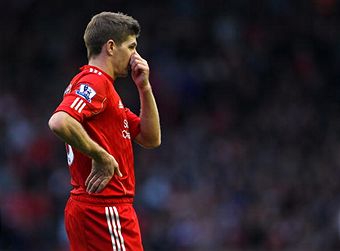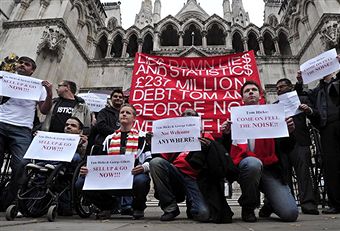Liverpool fans gathering outside the Royal Courts of Justice in the Strand would have been better advised to move a short distance westwards to Parliament Square to get our law-makers to address an essential problem in football: that we now have an extraordinarily unlevel playing field when it comes to the national game.
The fact is that the football industry is like a dysfunctional family and this has come about through muddle headed law-making.
Liverpool fans are concerned that their club might again be taken over by an owner with no association with their club.
If the new owner turns out to be the Singaporean Peter Lim, who has made a higher cash offer than the New England Sports Ventures, it would mean Liverpool falling into the hands of somebody who, all his life, has been a Manchester United fan.
All this will merely confirm their darkest fears that their club is just a trading commodity, not a sporting institution, as is being amply demonstrated in the High Court battle being waged by the current American owners.
Yet, what makes the situation worse is that, while fans are not allowed any rights as to who owns their club, the law gives other groups extraordinary privileges.
Fans not only do not have any rights, but are treated as if they do not count.
So, just consider what would happen if, as a result of the legal battles over the ownership of Liverpool, the Merseyside club were to go into administration.
This would undoubtedly have a devastating impact on the club with a possible points deduction and, maybe, a grim relegation battle, but for one group in the club life would not change.
 In an administration, the wages of the likes of Steven Gerrard (pictured) and Fernando Torres, upwards of ₤80,000 a week, would be protected.
In an administration, the wages of the likes of Steven Gerrard (pictured) and Fernando Torres, upwards of ₤80,000 a week, would be protected.As would the money the club owes to other clubs and all other “football-related debts” such as transfer fees.
This is part of the special creditors’ rule that the game of football enjoys.
So the pie-seller loses out if the club goes bust but the highly-paid footballer, earning in a year what the pie-seller may not earn in a lifetime, does not.
No other business is allowed such a privilege.
I have been told many times that these rules are for the good of football.
We must not, it has been said, judge the game by the high and mighty like Liverpool but by the many smaller clubs which would face extinction if this rule did not exist.
I can also appreciate that this rule came about when football was not an industry which attracts businessmen from round the world hoping they can make money, as George Gillett and Tom Hicks undoubtedly hoped and still hope to do.
It was then a cottage industry where club owners looked, not for the money because there was none, but for the prestige and kudos they would have in their local community.
But those times have gone. Football is now a commodity. Clubs are bought and sold, often because of their real estate value.
Indeed it could be argued that one reason why Gillett and Hicks bought Liverpool was that they saw the development of a new ground as part of the real estate opportunity the club provided.
However, this is not the only way the law discriminates in favour of certain sections of football, as opposed to other members of the football family.
Many footballers can start drawing their pension at the age of 35.
The law changed in 2006 but, provided the players had made the arrangement before then, they are still able to draw their pension at an age when most of the population has not even thought of the matter.
To think that we are now debating whether to increase the retirement age to 65, or even beyond.
Yes, this is a legacy of the days when a footballer finishing his career had little to fall back upon apart from running a pub and was entitled to money from the pension he had built up.
Consider also the influence the Professional Footballers Association has over who comes to this country to earn his living as a player.
If they are from the EU then, under the Treaty of Rome, the PFA can do nothing.
But, if they are not, then the PFA sits with the Home Office to monitor very strict guidelines ensuring that, only those considered of a very high standard of football, can come in.
Fine, we need to protect our young players. We do not want to be like Belgium where almost any player, most often from Africa, can walk in.
Yet no other union is allowed such a privilege.
Would we, for instance, allow such privileges to the Unite trades union to ensure what kind of plumbers come into this country?
Unite’s Charlie Whelan, the good Tottenham man, would love that but the very idea would meet with hoots of laughter.
But it is justified in football because the game is considered special.

The law may not make any allowances for fans to choose their owners but, in the current Liverpool mess, both Messrs Gillett and Hicks and RBS have used the fans for their own ends.
Had Liverpool been just another commodity then RBS, owned by us, the UK taxpayers, would have called in the debt long ago and taken charge of the club.
If this had meant putting the club into administration, they would not have worried as long as they got their money back.
But RBS did not want to pull the plug, fearing the fans’ reaction.
So they went for an elaborate device.
They continued to provide the loan but imposed a board on Liverpool with the instruction to sell the club and recover their money.
The board was so structured that it could, if necessary, out vote Gillett and Hicks.
Until last week’s events, this curious RBS-imposed management structure was not clear.
It only emerged when the offer from Boston Red Sox owner John W Henry was accepted by the RBS board members but rejected by Gillett and Hicks.
They tried to remove some of the board and their efforts resulted in the High Court hearing.
City takeover battles can end up in court but only the curious and badly regulated world of football could produce such soap opera.
And the element missing from that soap opera is the fan club.
What is the solution?
Either have a complete free for all and remove the privileges clubs have such as the football creditors’ rule.
Or, if the field cannot be levelled, then it is time to make sure that the disadvantaged majority – the fans – also get a stake in the club.
Much is talked about fans buying shares in the club.
My view is that we should follow the German principle where a 51 per cent stake would be controlled by the club itself and the owners would have to be based in this county.
This would preserve the club’s community roots and prevent foreign freeloaders just marching in and trying to take over a club with which they have no connection.
This is why Liverpool fans should be outside parliament pressing for a change in the law rather than seeking to influence High Court judges.
Mihir Bose is one of the world’s most astute observers on politics in sport and, particularly, football. He formerly wrote for The Sunday Times and The Daily Telegraph and until recently was the BBC’s head sports editor.

.jpg)